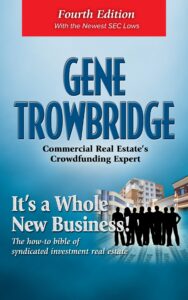For an introduction to real estate syndications read more here.
The sponsor or syndicator is the person (or group of people) who sets up the investment structure, brings together the pool of investors, oversees and manages the investment, and ultimately through their efforts generates a profit for the investors. The sponsor acts as a fiduciary to the investors and as such takes on a great deal of risk for forming the syndication. Since the sponsor is the party taking on most of the risk for the investment, there must be additional ways in which they are compensated to account for their increased risk. The following is an excerpt from Chapter 8 of It’s a Whole New Business! by Gene Trowbridge, Esq., CCIM, and describes the most common types of fees sponsors receive in a real estate syndication.
Acquisition fees
An acquisition fee is a fee the sponsor receives at the formation stage of the offering. The fee compensates the sponsor for time, effort, and expertise used in obtaining the investment opportunity. Most often the acquisition fee is expressed as a percentage of the money invested in the offering. Typical fees range from 5% to 10% of the money raised. Sometimes, the acquisition fee is stated as a percentage of the price of the property acquired when there is a specific property. Generally, this method uses 2% to 5% of the price of the property.
Ownership interests
Often the sponsor takes a direct ownership interest in the offering as a form of compensation for bringing the investment opportunity to the market. The investors put up all the money for a percentage of the company and the sponsor gets the balance. Typical ownership interest splits at formation range from 30% to 50% for the sponsor. Taking ownership interests directly at formation can cause a tax problem for the sponsor because if the ownership interest has an immediate ascertainable value, it is treated as ordinary income and is taxable when received.
Asset management fees
The sponsor should receive payment for managing the company, apart from managing the real estate which they may not actually do. The asset management fee is an expense allocated to the company, not to the property. Asset management fees are sometimes calculated as a percentage of the revenue the company produces, usually 1% to 2%., paid on a quarterly basis. In other situations, the asset management fee is based on the amount of money raised from investors. If the company raised $2 million dollars, the asset management fee might be 1% to 2% of that amount, paid annually. Finally, many sponsors set the amount of the asset management fee as a fixed annual dollar amount, paid monthly or quarterly.
In addition to the three fees mentioned above, the sponsor will likely receive a percentage of the cash available to distribute from the operations of the company.
Share of operational cash flows
When the company generates cash flow that can be distributed, it is common that the sponsor shares in the cash flows. Frequently, the sponsor will receive between 25% and 50% of the cash flows generated by the operations of the company.
Share of refinancing proceeds
When a property is a value add or a new construction project there can be a time when the property can be refinanced to return the investors a portion of their original cash investment without selling the property. If the sponsor has ownership interests in the company, they may get a share of the refinancing proceeds.
In addition, the sponsor may get a percentage of the refinancing proceeds. It is common for the refinancing proceeds to go directly to the investors as a return of capital. If the proceeds exceed the investors’ original investment, the sponsor and the investors will split any excess. Sometimes the refinancing proceeds are simply split between the investors and the sponsor without regard to whether the sponsor has any ownership interests.
Share of sales proceeds
When the sponsor has an ownership interest, the sales proceeds are split on a pro rata basis. But when the sponsor is only sharing in the cash distribution, it is likely that the investors will get a distribution of sales proceeds to equal a return of their original investment, as a priority distribution. Then the balance of the cash available for distribution is split between the investors and the sponsor. It is common for the sponsor’s split to be between 30% and 50%.
Real estate commissions for deal-making activities
Sometimes the sponsor, who is a real estate licensee, will collect commission on the sale of the property. But as explained earlier, doing a syndication just for real estate commission is a poor decision on the sponsor’s part, and any cash earned from a commission should not be considered when calculating the present value of the sponsor’s position.
How are distributions structured?
While there are endless variations on how cash is distributed in a syndication, the most common pattern of distribution is called a waterfall.
Waterfall from operations (returns on capital.)
The first two steps are designed to pay the manager back for any dollars owed to the sponsor and any interest due on those amounts for the time the sponsor has left their money in the transaction.
Once the manager is paid back, any cash available for distribution is used to make up any arrearages in the preferred return and the current preferred return that should be paid to the investors.
Once the manager and the preferred returns are dealt with, any remaining cash available for distribution is split according to the percentage split included in the operating agreement.
Waterfall from a capital transaction (return of capital)
When there is a return of capital, generally as a result of a refinance or sale, it is common for the investors to get a priority return up to the amount of their original investment. Then any fees due to the sponsor are paid. Remaining cash available for distribution is then split according to the percentages found in the operating agreement
As you can see, there are a multitude of sources and methods for a sponsor to make money from a syndication. It is important to keep in mind the risk/reward of a syndication when deciding what and how to charge as a sponsor. If you would like more personal and detailed advice on how to structure your syndication feel free to contact one of our attorneys today for a free consultation.
You can also purchase a copy of Gene’s book It’s a Whole New Business!, which covers everything you need to know to set up a real estate syndication, here.




